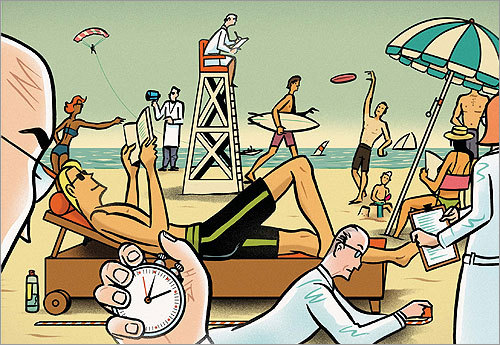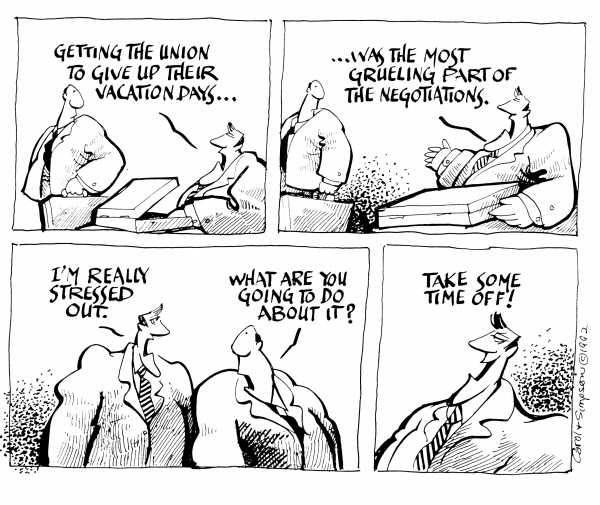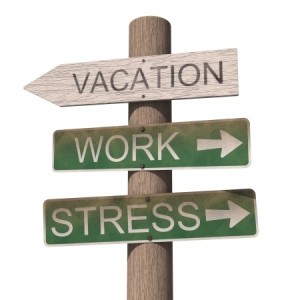 At most companies in the United States, vacation starts in the most un-relaxing way possible: filling in a permission form. Accruing enough time to go on vacation then having to go and ask for permission felt more like a school field trip than a grown-up getaway. Worse, many companies insist employees take vacation time before a year-end deadline or lose out. Is there a better way to care for every companies greatest resource – their employees?
At most companies in the United States, vacation starts in the most un-relaxing way possible: filling in a permission form. Accruing enough time to go on vacation then having to go and ask for permission felt more like a school field trip than a grown-up getaway. Worse, many companies insist employees take vacation time before a year-end deadline or lose out. Is there a better way to care for every companies greatest resource – their employees?
At HubSpot , they designed a progressive policy that allows employees to build their work around their life, not the other way around. They are part of a growing trend, now around 3 percent of US companies.
Only about 13 percent of employees in the US are engaged in their work. Meaning? Gallup defines ‘engaged employees’ as: ‘those who are involved in, enthusiastic about and committed to their work and workplace’ (www.gallup.com/poll).
Growing a business is virtually impossible when employees can’t wait to get out the door at 5 PM. That’s why Richard Branson, UK founder of The Virgin Group , announced a vacation “non-policy” that allows his personal staff—some 170 employees—to take as much vacation as they want, with no one keeping tabs. He says: “I offer unlimited vacation because, in my experience, I’ve learned that when you treat employees like grown-ups, they act like grown-ups. When employees know they are trusted to take vacation when they need or want one, they’re more willing and excited to produce good work when they’re in the office. Think about your own working style. If you were able to get all of your work done by Thursday then take a three-day weekend, would you? I would!”
Companies should build a modern workplace where people can spend less time worrying about their work/life balance, and more time thinking about how they can produce results. Unlimited vacation means employees have as much flexibility as they need and don’t have to wait for a calendar holiday to relax.
Business managers have more time to spend watching results instead of the clock. HubSpot realized this a few years ago after one of their engineers had worked consistently late nights on a big, company-wide initiative. The project completed, he went to ask CEO Brian Halligan, to sign off his requested vacation days.
Something was wrong with this picture; he could be the main force behind the company’s growth, but wasn’t allowed to take a day off without permission? This didn’t sit well with Brian and they’ve had an unlimited vacation policy ever since. ShortStack have a similar vacation benefit, only they call it “take what you need.”
Netflix‘s holiday policy is to have no policy at all. If that sounds like a recipe for anarchy, devoid of essential traditional workplace stand-bys such as temperance and hard work, think again. In its own way, Netflix’s non-policy is more attuned to the nature of 21st century work, and even to the values of industriousness and self-discipline, than its old, sterner counterparts. In effect, it evaluates employees on results, not the time they are in the building.
Making it work for your company
The key to any “no policy” policy is culture. If you hire the right people, unlimited vacation doesn’t lead to missed deadlines and unmet goals. Top employees are not interested in slacking off when they’re motivated by autonomy, the best companies nowadays make sure everyone knows how their work benefits the company.
The real advantage of not tracking people is that employees have unlimited flexibility in their work/life balance. For example, most of the US is already stressed out at the thought of making a trip home on the most travelled days of the year. Don’t forget, Planes, Trains & Automobiles [1987] came about following real travel experiences.
Companies with unlimited vacation policies make it easier for employees to get home for the holidays because they don’t have to think twice about leaving a day or two earlier when fares are cheaper and the crowds are less hectic.
The difference between two days off and three days off is insignificant for your business but for employees, it could mean fewer headaches, less stress, and a greater appreciation for your workplace.
Employees take advantage of the policy to schedule a doctor’s appointment in the afternoon instead of waiting six months, work from early morning to leave at 3 PM and avoid rush hour traffic.
The time away from the office may not look like a vacation, but it has the same benefits: employees are more engaged and ultimately more productive at work. How does it work? Richard Branson says: “I have always had a philosophy of hiring self-reliant, motivated people who have proven time and time again to be both loyal and accountable. In four years, the unlimited vacation plan has only been abused once, and it was really a hiring mistake, not a policy pitfall.”
How motivated is an applicant? “On one occasion when we didn’t have any positions open, an applicant politely followed up with me for six weeks until I finally hired him. He is now our Vice-President of Sales”. The process leading up to the interview can reveal more about the person’s work ethic than the interview itself.
If you feel your company simply cannot offer unlimited vacation, consider adapting the “I don’t care when you work, as long as your work gets done” policy. This provides flexibility for employees with families or for those who have an obligation pop up, but it does not compromise the business.
 In conclusion, Companies shouldn’t add to the strife of life, they should subtract from it, so employees can spend more time thinking about how to do their job well and less time filling out endless forms.
In conclusion, Companies shouldn’t add to the strife of life, they should subtract from it, so employees can spend more time thinking about how to do their job well and less time filling out endless forms.
Thanks to:
http://thenextweb.com/the-real-reason-unlimited-vacation-policies-work
http://www.forbes.com/could-unlimited-vacation-time-work-for-your-company
See also: “Reference Guide on our Freedom & Responsibility Culture by Netflix
